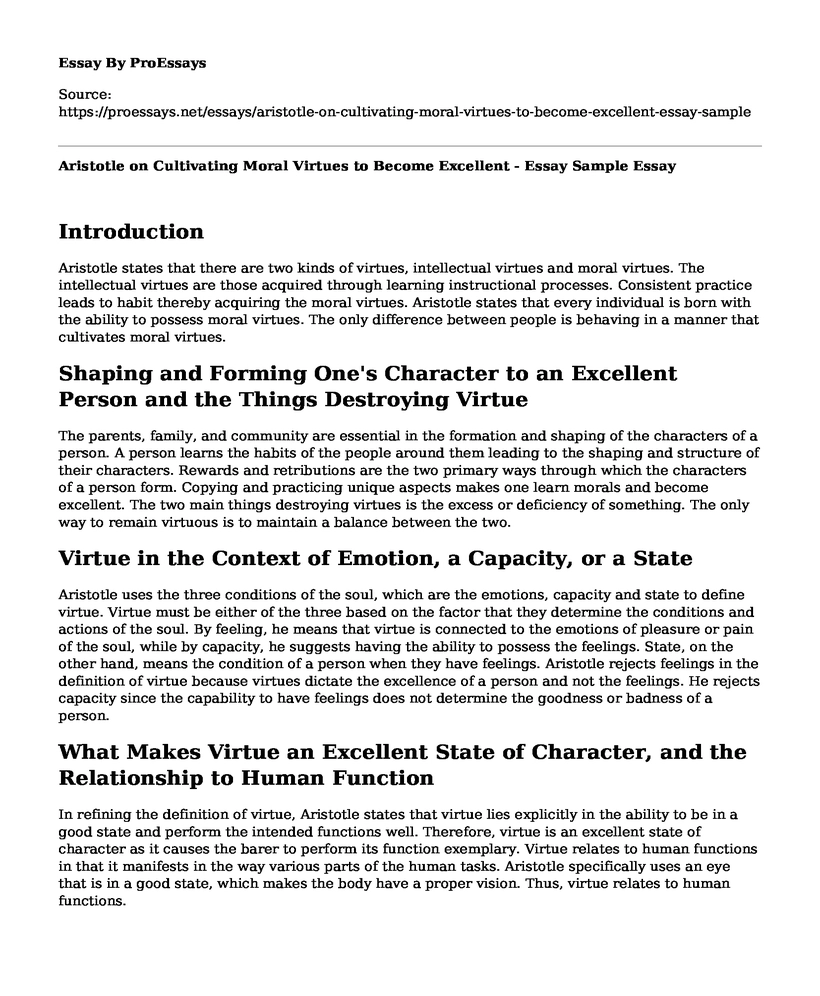Introduction
Aristotle states that there are two kinds of virtues, intellectual virtues and moral virtues. The intellectual virtues are those acquired through learning instructional processes. Consistent practice leads to habit thereby acquiring the moral virtues. Aristotle states that every individual is born with the ability to possess moral virtues. The only difference between people is behaving in a manner that cultivates moral virtues.
Shaping and Forming One's Character to an Excellent Person and the Things Destroying Virtue
The parents, family, and community are essential in the formation and shaping of the characters of a person. A person learns the habits of the people around them leading to the shaping and structure of their characters. Rewards and retributions are the two primary ways through which the characters of a person form. Copying and practicing unique aspects makes one learn morals and become excellent. The two main things destroying virtues is the excess or deficiency of something. The only way to remain virtuous is to maintain a balance between the two.
Virtue in the Context of Emotion, a Capacity, or a State
Aristotle uses the three conditions of the soul, which are the emotions, capacity and state to define virtue. Virtue must be either of the three based on the factor that they determine the conditions and actions of the soul. By feeling, he means that virtue is connected to the emotions of pleasure or pain of the soul, while by capacity, he suggests having the ability to possess the feelings. State, on the other hand, means the condition of a person when they have feelings. Aristotle rejects feelings in the definition of virtue because virtues dictate the excellence of a person and not the feelings. He rejects capacity since the capability to have feelings does not determine the goodness or badness of a person.
What Makes Virtue an Excellent State of Character, and the Relationship to Human Function
In refining the definition of virtue, Aristotle states that virtue lies explicitly in the ability to be in a good state and perform the intended functions well. Therefore, virtue is an excellent state of character as it causes the barer to perform its function exemplary. Virtue relates to human functions in that it manifests in the way various parts of the human tasks. Aristotle specifically uses an eye that is in a good state, which makes the body have a proper vision. Thus, virtue relates to human functions.
Virtue as a "Mean" Between Two Vices
Aristotle states that virtue is the mean between vices to mean that it is the central point between two vices. A virtue would become a vice if it either is deficient or has an excess of certain feelings or capacity. In other words, virtue stands out to be the central point between two opposite stances. Thus, virtue becomes the mean when it forgoes the deficiency and excess sides of it and stands out as the intermediate.
What to Avoid or Guide Against to Achieve the Mean
Understanding the pleasure or pains that come with an action or feeling is the first step in achieving the mean between the vices. A person needs to avoid the excess side of the vice, but rather focus on the deficiency and stretch towards the excess to achieve the mean. A person has to avoid being judgmental when trying to achieve the intermediate, as this introduces biases in the process.
Cite this page
Aristotle on Cultivating Moral Virtues to Become Excellent - Essay Sample. (2023, Mar 30). Retrieved from https://proessays.net/essays/aristotle-on-cultivating-moral-virtues-to-become-excellent-essay-sample
If you are the original author of this essay and no longer wish to have it published on the ProEssays website, please click below to request its removal:
- Essay Sample on Dissociative Identity Disorder
- Essay Sample on Kant's Deontology
- Comparing Plato's Allegory of the Cave to a Real-Life Situation
- Essay Sample on Relative vs. Universal Moral Theories: Understanding the Difference
- Paper Example on Ethical Decision-Making: Kant and Utilitarianism Perspectives
- Critical Appraisal: A Must in the Medical Field - Free Report Example
- Essay Sample on Whether Abortion is Morally Justifiable







